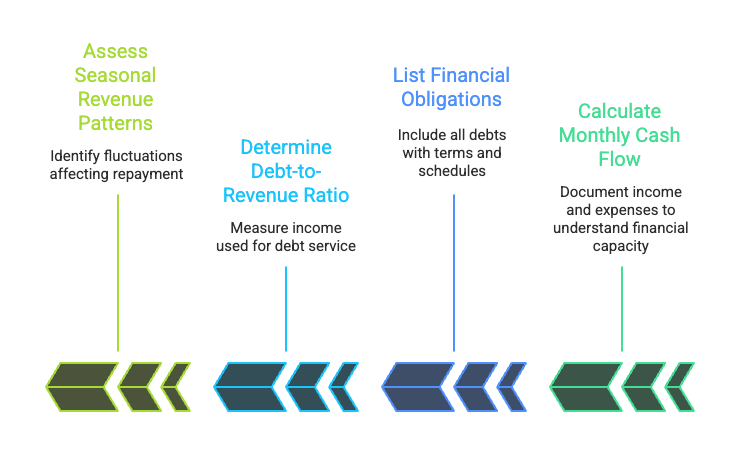When your business grows, you might find yourself needing multiple funding sources to keep operations running smoothly. Managing multiple business advances responsibly becomes crucial for maintaining financial health and avoiding the pitfalls that could harm your company's future. Many small business owners face the challenge of juggling different repayment schedules, varying terms, and complex financial obligations without a clear strategy.
The key to success lies in understanding how these advances work together and implementing systems that prevent debt stacking while maintaining healthy cash flow. Smart business owners know that proper advance management can be the difference between sustained growth and financial strain.
Evaluate Your Current Financial Position

Before taking on multiple advances, evaluating your current financial position helps establish a solid foundation for responsible management. This initial assessment becomes your roadmap for making informed decisions about future funding needs.
- Calculate your total monthly cash flow: Document all incoming revenue streams and fixed expenses to understand your baseline financial capacity.
- List all existing financial obligations: Include current advances, traditional financing, vendor payments, and other recurring debts with their specific terms and payment schedules.
- Determine your debt-to-revenue ratio: This metric helps you understand how much of your income goes toward debt service, which is crucial for avoiding overextension.
- Assess seasonal revenue patterns: Many businesses experience fluctuations that could impact your ability to meet repayment obligations during slower periods.
Understanding these fundamentals allows you to make strategic decisions about which advances might work best for your situation. Remember that merchant cash advances typically involve variable repayment terms tied to your revenue cycles, so accurate cash flow projections become even more important.
Create a Comprehensive Repayment Strategy
Creating a comprehensive repayment strategy ensures that managing multiple business advances responsibly becomes a systematic process rather than a daily struggle. This approach helps prevent missed payments and reduces financial stress.
- Map out all payment schedules: Create a master calendar showing when each advance payment is due, including daily, weekly, or monthly obligations.
- Prioritize payments by terms and consequences: Some advances may have more severe penalties for late payment, while others might offer more flexibility during temporary cash flow issues.
- Build buffer periods into your planning: Account for unexpected expenses or revenue dips by maintaining healthy cash flow specifically for advance payments.
- Set up automated systems where possible: Streamline the payment process to reduce the chance of human error while maintaining oversight of your cash position.
A well-structured repayment strategy also includes regular reviews to adjust for changing business conditions. As your revenue grows or shifts, your repayment approach might need refinements to maintain optimal cash flow management.
Implement Debt Stacking Prevention Measures
Debt stacking prevention becomes essential when managing multiple business advances responsibly, as taking on too many advances simultaneously can create unsustainable repayment obligations. Research shows that stacking multiple advances can impair cash flow and increase default potential significantly.
- Establish clear limits on total advance amounts: Set maximum thresholds based on your monthly revenue to prevent overextension regardless of available offers.
- Space out advance applications strategically: Allow time between advances to assess their impact on your cash flow before adding additional obligations.
- Monitor your debt service coverage ratio: Keep track of how much revenue goes toward advance repayments to maintain healthy operational cash flow.
- Research alternative funding options: Consider consolidation opportunities or restructuring existing advances before adding new ones to your financial mix.
Prevention measures also include being selective about advance providers and terms. Not all funding opportunities align with your business model, and sometimes declining an offer protects your long-term financial stability better than accepting additional capital.
Communication Strategies with Lenders
Effective communication strategies with lenders form a cornerstone of managing multiple business advances responsibly. Maintaining open dialogue can help prevent problems before they escalate and may provide options during challenging periods.
- Establish regular check-ins: Proactive communication demonstrates responsibility and helps build relationships that could benefit you if adjustments become necessary.
- Be transparent about your financial situation: Honest discussions about cash flow challenges often lead to more favorable outcomes than trying to handle problems alone.
- Document all agreements and modifications: Keep detailed records of conversations, payment adjustments, and any changes to original terms for future reference.
- Respond promptly to lender inquiries: Quick responses show professionalism and help maintain trust, which could be valuable if you need flexibility later.
Strong lender relationships also create opportunities for better terms on future advances. When lenders see consistent communication and responsible management, they're often more willing to offer favorable conditions or work with you during temporary difficulties.
Explore Refinancing and Consolidation Options
Exploring refinancing options and consolidation options provides powerful tools for managing multiple business advances responsibly while potentially reducing costs and simplifying your financial obligations. These strategies can transform complex payment schedules into more manageable arrangements.
- Debt consolidation benefits: Combining multiple advances into a single payment can reduce administrative burden, lower overall costs, and improve cash flow predictability.
- Refinancing opportunities: Better terms might become available as your business grows or your creditworthiness improves, making refinancing a valuable consideration.
- Timing considerations: The best time to explore these options is often when you have strong cash flow and can negotiate from a position of financial strength.
- Professional guidance: Working with financial advisors who understand business advances can help identify opportunities you might miss and negotiate better terms.
Consolidation and refinancing aren't always the right choice for every situation, but they deserve consideration when managing multiple advances becomes burdensome. These options might provide the breathing room needed to focus on growing your business rather than juggling complex payment schedules.
Successfully managing multiple business advances responsibly requires strategic planning, consistent execution, and ongoing attention to your financial health. By evaluating your position carefully, creating comprehensive repayment strategies, preventing debt stacking, maintaining strong lender relationships, and exploring consolidation opportunities, you build a sustainable approach to business funding.
Remember that the goal isn't just to manage current obligations, but to create systems that support your business's long-term growth and stability. Smart advance management becomes a competitive advantage, giving you the financial flexibility to seize opportunities while maintaining operational stability.
Take time to implement these strategies gradually, focusing on the areas where your business needs the most improvement. With careful attention and consistent effort, managing multiple business advances can become a streamlined part of your overall financial strategy rather than a source of daily stress.

.png)






